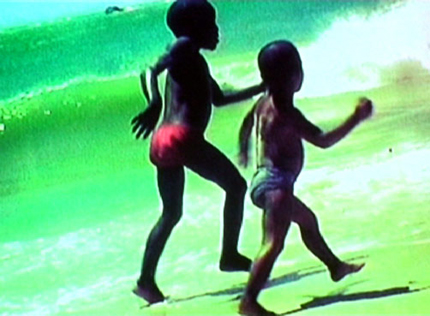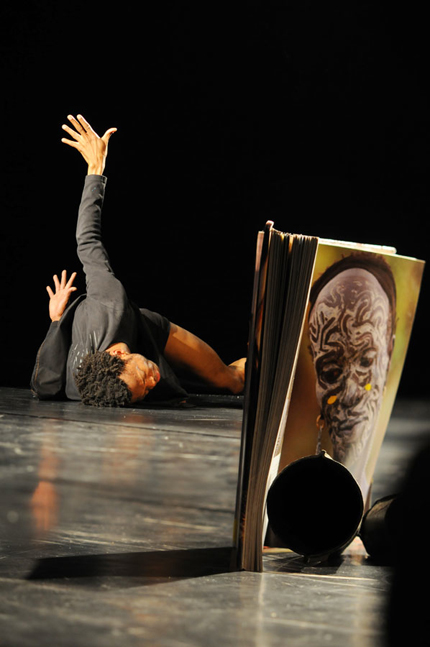Festival Theaterformen in Braunschweig – Thematic weekend: The Presence of Elsewhere – Here and Now
The stage installed in the big top in front of the Staatstheater Braunschweig is dimly lit. We can just see a black man running in slow motion without actually moving forward. His face is covered in jet black paint. He excessively swings his arms forwards and backwards, moves his head from left to right and stares at the audience. His heavily painted red mouth opens to a broad grin that shows shiny white teeth. Around his chest he wears an explosive vest which is shown openly during the whole performance. His movements change into a bodybuilding-persiflage, change into the skipping movement of a boxer, change into a fast run and finally into a flight – yet he is not leaving his spot on the stage. Later on, the performer is going to wear a conventional ballet-tutu, he is going to conceal his eyes behind big dark sunglasses and a metallic crown of thorns is going to cover his head. Then he will climb through the audience and over the rows of seats, he will press his body against the spectators because there will be very little space and he will run his hand over some heads in the audience.
I am a member of this audience and I know that this performance is highly reflective and well thought out. Mercilessly it uncovers stereotypes and prejudices that still exist and somehow influence the behavior of many people. I am not easily scared when I’m in a theatre context and I believe myself capable of dealing with my somewhat prejudiced subconscious.
But I can’t help it, they’ve got me. Completely against any reason my heart starts beating faster. The black menace, the suicide bomber, the religious zealot, the eyes, which I can’t see, which are threatening me because I don’t know what’s going on behind that black mask, the insecurity. What if the performer has planned this moment for months and months, what if, here and now, he’ll blow himself and us into pieces? What if this highly theatrical event changes into utter seriousness in order to score off those reflective theatregoers, those politically correct intellectuals? To blow oneself up, here and now and thereby setting an example? It seems that despite my efforts to keep my thoughts unimpaired and unbiased my subconscious prejudices enforced by a lively imagination have taken over…
What I had to deal with that evening was a really clever and intelligent performance. With Influx Controls I wanna be wanna be the South African dancer Boyzie Cekwana played with great virtuosity on my subconscious fears. I had to confront the fact that, despite my efforts, I was to a certain extent susceptible to well-known prejudices concerning outward appearances or unfamiliar behavior displayed by people of different cultures. For some minutes, a highly artificial and artistic event suddenly became a full-grown horror-trip. This experience not only told me something about the performer’s situation but also a lot about myself.
This aesthetic experience also represents the informative and at the same time always disconcerting quality of every aspect of the weekend’s main focus The Presence of Elsewhere – Here and Now at the festival Theaterformen in Braunschweig. Not only the presentations of videos and performances but also the lectures incited every participant to question their point of view and to get to know different perspectives which maybe also led to a questioning of one’s self-concept as I described it at the beginning. Unfortunately, or I’d better say fortunately, there were too many things to see, to hear and to experience.
The series of lectures started with the political scientist Kien Nghi Ha from Berlin who gave a very informative survey about the collective defense mechanism Germany has developed concerning the country’s colonial past. By analyzing speeches of contemporary politicians (e.g. Horst Köhler, Peter Struck) he confirmed his alarming thesis about “the silent return of colonial discourses in Germany”. Philosopher and theologian Fabien Eboussi Boulaga from Cameroun was announced with a lecture about “Intercultural and Political Dialogue” between Africa and Europe. He began his lecture by calling this title “daring” and went on by explaining that the subject of intercontinental dialogue regarding the difficult process of the decolonization of Africa was too complex to be treated in half an hour. Grada Kilomba from Berlin filled in on short notice for Nasser Al-Sheik. She read a chapter of her book Plantation Memories – Episodes of Everyday Racism. This brief lecture inspired a discussion about the situation of black people living in Germany. Their everyday life is a struggle against their fellow white citizens’ assumptions that black people couldn’t possibly be genuine Germans. Instead they’re frequently asked when they will be leaving again for their native country. Hereunto Kilomba quoted a passage from Frantz Fanon’s Black Skin White Masks: „If people like me, it’s in spite of my color. If they don’t like me, it’s not because of my color.” This statement brilliantly points out the German dilemma of apparent tolerance and acceptance coexisting with denial and repression.
Born in Kenya, grown up in Australia, currently living in Amsterdam: In her performance Hybrid Eyes Esther Mugambi was dealing with her native country that she never really got to know. She projected photos of six Kenyan women onto her body and lend them her voice. Then she played with different associations evoked by her outward appearance, her Afro-hairstyle, her black skin. She crept over the zebra-crossing-like stage, roaring ironically like a lion, then we saw her on the screen completely naked with white stripes painted on her body and running first through dark streets then over a steppe and at last hiding in the thicket of a forest. At one moment in her performance, she sang some lines from her song There’s No Such Thing as Kenyan When You Have Left and Gone and it became clear that despite of her efforts to understand the Kenyan life and despite the fact of being born in Kenya, she’d never get the whole picture of it from her now alienated point of view.
Ever since I saw the performance of Congolese dancer Faustin Linyekula, Le Cargo, one sentence is stuck in my mind: „I dance for you to send money to my family.” This simple phrase points out one of the problems that underlie any peculiar preoccupation with artists from former colonized countries. This problem has also been frequently mentioned in regards to Postcolonial Theory. There is always a danger of using a subject as important as the discussion of the colonial past as an opportunity to build a new label in the art market as well as in the academic context. For some years this new label would serve as an academic and artistic hype and then would go back to normal, i.e. insignificance. Whereas not only the artists are dealing with existential needs and requests but everyone concerned by the contemporary problems this so-called past is still creating. Every single lecture, performance and video-installation presented during the weekend made clear that a dialogue without prejudices between cultures of former colonized and colonizing countries was vital but yet in its infancy.
I think that Silke Bake, the curator of this thematic weekend, did a brilliant job by bringing together so many different people to speak, dance and show their work. I’m convinced that this experience had a pertinent effect not only on my way of thinking. The fact that several days afterwards we were still discussing some of the performances makes me wish for more of those productively disturbing weekends.



